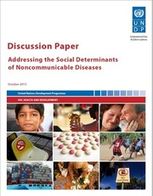UNDP Discussion Paper:
Addressing the Social Determinants of Noncommunicable Diseases
United Nations Development Programme (UNDP) has recently issued a Discussion Paper titled "Addressing the Social Determinants of Noncommunicable Diseases". It offers a typology of multisectoral action on NCDs and a framework for actors outside the health sector to take action.
Noncommunicable diseases (NCDs) are not just the single greatest cause of preventable illness, disability and mortality worldwide, it is also a major development challenge. Low and middle income countries face large burdens of NCDs, often in addition to traditional health challenges, constituting a double burden of disease. The four main NCDs - cardiovascular disease, diabetes, cancer and chronic respiratory disease - are related to four main risk factors: tobacco use, harmful use of alcohol, physical inactivity and unhealthy diet. These behavioural causes have root causes. The UNDP report point out that differential exposures to NCD risk behaviours and access to preventive care can be traced to inequities in the conditions of daily life and further traced to underlying social, economic, political, environmental and cultural factors (and policy choices), broadly known as social determinants. Responding to NCDs, like responding to HIV and other health issues, is not simply a matter of changing individual behaviour in isolation; broader changes in social, economic, environmental and cultural contexts are also needed.
The UNDP discussion paper offers a typology of multisectoral action on NCDs. Contribution from sectors outside of health is crucial especially to address social determinants. The report also outlines more specific areas and opportunities for actors outside the health sector.
Alcohol is one of the four main risk factors for NCDs. Regular consumption of excessive amounts of alcohol (binge drinking) is not only associated with CVD but also other health risks, including HIV and other sexually transmitted infections, domestic violence, TB and road traffic accidents. Evidence is limited on the distribution of harmful use of alcohol in low-income countries. What evidence does exist suggests that it is more prevalent among lower socio-economic groups and more prevalent among men than among women, according to the report. The development of national alcohol policies in Malawi and a ban on tujilijili - liquor in sachets - in Zambia is being portrayed in the report as good examples of interventions to address the social determinants of NCDs.
See the full Discussion Paper here: Addressing the Social Determinants of Noncommunicable Disease
RELATED ARTICLES
- SAFER – a new WHO initiative to boost national alcohol policy processes
- UN High-Level Meeting on NCDs misses the target
- Bolder actions needed to reverse the tide of NCDs and mental disorders
- Civil society networks call for stronger action against non-communicable diseases
- Integrating national policies on the harmful use of alcohol, gender-based violence and HIV
- Number of premature and avoidable NCD deaths on the rise
- Alcohol a risk factor behind many critical development issues
- WHO: More needs to be done to prevent alcohol-related harm
- The Lancet Commission points to alcohol taxation for health
- Risking your Health

